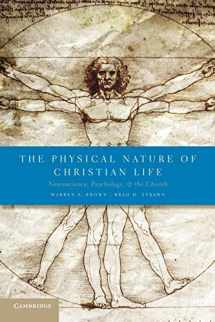
The Physical Nature of Christian Life: Neuroscience, Psychology, and the Church
Book details
Summary
Description
This book explores the implications of recent insights in modern neuroscience for the church's view of spiritual formation. Science suggests that functions of the brain and body in collaboration with social experience, rather than a disembodied soul, provide physical basis for the mental capacities, interpersonal relations, and religious experiences of human beings. The realization that human beings are wholly physical, but with unique mental, relational, and spiritual capacities, challenges traditional views of Christian life as defined by the care of souls, a view that leads to inwardness and individuality. Psychology and neuroscience suggest the importance of developmental openness, attachment, imitation, and stories as tools in spiritual formation. Accordingly, the idea that care of embodied persons should be fundamentally social and communal sets new priorities for encouraging spiritual growth and building congregations.


We would LOVE it if you could help us and other readers by reviewing the book
Book review





